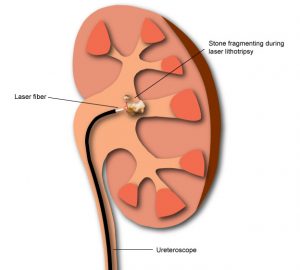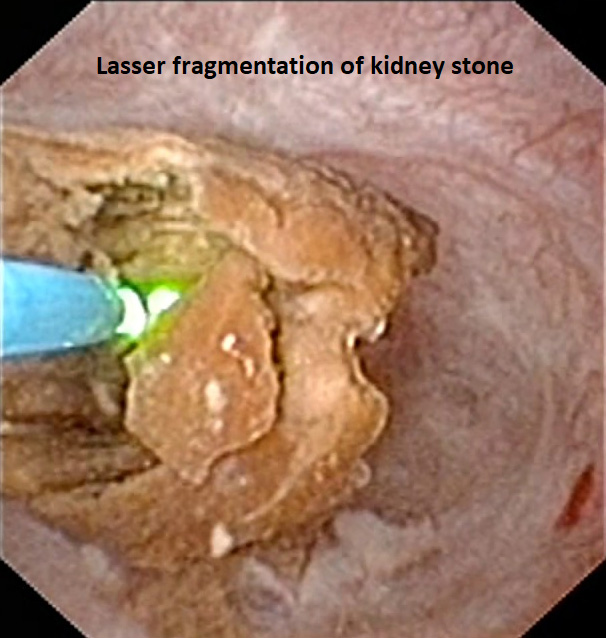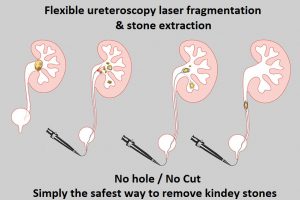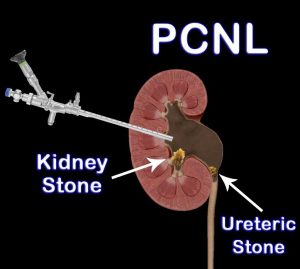Kidney Stone Laser Surgery
What is Kidney Stone Laser Surgery?
Stone Laser Surgery is one of the many minimally invasive surgeries which does not require cuts on a patient’s body. It works by inserting a small instrument called a ureteroscope into the urethra and bladder to reach the ureter and kidney. When the kidney stones appear, the surgeon can then use laser technology to disintegrate the stones into smaller pieces which are either removed manually or are passed later on during urination.
What are the types of Stone Laser Surgery? As medicine evolves, so do the different tools and choices surgeons and patients have in handling medical cases. Patients suffering from kidney stones can rest at ease in today’s world knowing that they have a wide range of choices that can provide the results they hope for in the most effective and efficient way possible.
Ureteroscopy originates from the word ureteroscope which is a long thin tube with an optic camera at the end. When performing ureteroscopy, the ureteroscope is inserted through the urethra and bladder into the ureter or kidney. When the stones are found, they are extracted using a stone basket. If needed, large stones are crushed into smaller pieces using laser. This procedure is best used for the treatment of small to medium kidney stones located in the urinary tract and is performed under general or spinal anesthesia.
There are two types of ureteroscopes, flexible and rigid. The rigid ureteroscope has a rigid tip which limits its movement and access to some parts of the kidney; on the other hand, the flexible ureteroscope has a flexible tip that allows the surgeon to reach all the areas inside the kidney and extract stones no matter of their location.
More Specializations
Laparoscopic surgery allows the surgeon to perform complex surgeries through small incisions. Recovery is very quick and with minimal pain as tiny incisions are being made. Very minimal scarring and quite esthetic.
Read more
Laser surgery for the prostate is a revolution that allows us to perform surgeries to the prostate while the patient is on blood thinners without the need to stop them, especially in patients who need to be continuously on such medications like Aspirin etc.
Read more
Laser surgery for kidney stones eradicates the need to perform painful incisions in order to remove kidney stones and gives the advantage of being very accurate and incision-free in most cases.
Read more
Sexual dysfunction in men.
Read more
Excess weight is associated with many comorbid conditions, such as heart disease, cholesterol imbalances, diabetes, and the Metabolic Syndrome.
Read more
Worldwide, diabetes is on the rise, majorly due to an unhealthy lifestyle as well as predisposing factors.
Read more
More Specializations
Laparoscopic surgery allows the surgeon to perform complex surgeries through small incisions. Recovery is very quick and with minimal pain as tiny incisions are being made. Very minimal scarring and quite esthetic.
Read more
Laser surgery for the prostate is a revolution that allows us to perform surgeries to the prostate while the patient is on blood thinners without the need to stop them, especially in patients who need to be continuously on such medications like Aspirin etc.
Read more
Laser surgery for kidney stones eradicates the need to perform painful incisions in order to remove kidney stones and gives the advantage of being very accurate and incision-free in most cases.
Read more
Sexual dysfunction in men.
Read more
Excess weight is associated with many comorbid conditions, such as heart disease, cholesterol imbalances, diabetes, and the Metabolic Syndrome.
Read more
Worldwide, diabetes is on the rise, majorly due to an unhealthy lifestyle as well as predisposing factors.
Read more



MiniPerc also known as MiniPCNL is a recent practice in the medical world. It follows the same process of the PCNL mentioned above but utilizes smaller and thinner instruments to access and defragment kidney stones. The benefits of this tool are outstanding since they cause less damage to the kidney, less pain, and less blood loss.

